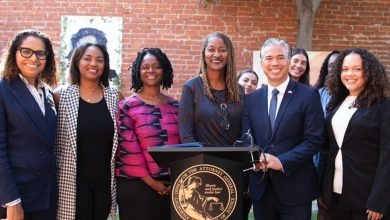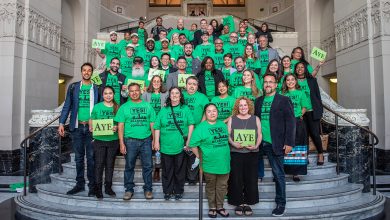Biden acknowledged America’s ‘Original Sin of Slavery,’ Pledged Infrastructure Dollars and Long-Term Financial Aid

By Post Staff
And news dispatches from the Guardian, CNN and AP
When President Joe Biden went to Angola this week the purpose was ostensibly to advance the Lobito Corridor, an unfinished 800-mile railway project meant to facilitate the transfer of critical minerals from interior countries to western ports for exports.
But in a visit to the country’s slave museum, he acknowledged America’s dark past and its connection to Angola in the presence of three descendants of the first captives who arrived in Virginia from Angola in 1619.
The child of two of those captives — Antony and Isabella — was William Tucker, born around 1623. Three of his descendants were present when Biden spoke at the country’s slave museum and humbly acknowledged how the horrific history of slavery has connected the United States and Angola.
“While history can be hidden, it cannot and should not be erased. It should be faced. It’s our duty to face our history,” he said. “The good, the bad and the ugly. The whole truth. That’s what great nations do,” he said.
“It was the beginning of slavery in the United States. Cruel. Brutal. Dehumanizing. Our nation’s original sin. Original sin. One that’s haunted America and cast a long shadow ever since,” Biden spoke as he honored the Tucker family.
After introducing Wanda Tucker, Vincent Tucker and Carlita Tucker, he delivered a hopeful vision for the future in a major speech from the country that was the point of departure for millions of enslaved Africans.
(Wanda Tucker now serves as the faculty chair of psychology, philosophy and religious studies at Rio Salado College in Arizona.)
“Our people lie at the heart of a deep and profound connection that forever binds Africa and the United States together. We remember the stolen men and women and children who were brought to our shores in chains and subjected to unimaginable cruelty,” Biden said in remarks at the National Museum of Slavery, which is built near the chapel where enslaved individuals were forcibly baptized before being sent to America.
The museum was built on the property of Álvaro de Carvalho Matoso, one of the largest slave traders on the African coast.
Biden told the attendees that he’s proud to be the first president to visit Angola and that he’s “deeply optimistic” about the future relationship between the nation and the US.
“The story of Angola and the United States holds a lesson for the world. Two nations with a shared history, an evil of human bondage,” Biden said. “Two nations on the opposite sides of the Cold War, the defining struggle of the late part of the 20th century. And now, two nations standing shoulder to shoulder working together every day. It’s a reminder that no nation need be permanently the adversary of another.”
Biden’s trip aimed to highlight U.S. investments in Angola and the continent in the face of deepening Chinese influence in the region, as Beijing has poured hundreds of billions of dollars into Africa through its Belt and Road Initiative.
Biden took a swipe at China’s moves, without calling out the country by name, and argued the US presents a better alternative.
“The United States understands how we invest in Africa is as important as how much we invest,” Biden said.
“In too many places, 10 years after the so-called investment was made, workers are still coming home on a dirt road and without electricity, a village without a school, a city without a hospital, a country under crushing debt. We seek a better way, transparent, high standard, open access to investment that protects workers and the rule of law and the environment. It can be done and will be done,” the president said.
Biden’s speech comes during what likely could be his last trip abroad as president and as he seeks to deepen relationships with Angola and other African nations at a time when China has made significant inroads in the continent with hundreds of billions of dollars of infrastructure investments, far outpacing the U.S.
During his remarks, Biden touted U.S. efforts to expand its relationships across Africa, including billions of dollars in investments in Angola.
He also announced over $1 billion in new US humanitarian assistance for Africans who have been displaced by historic droughts across the continent.
“But we know African leaders and citizens are seeking more than just aid. You seek investment.
So, the United States is expanding its relationships all across Africa,” Biden said, adding later: “Moving from patrons to partners.”
Ahead of his remarks, the president also met with Angolan leaders, including young people at the museum.
Biden started his day with a bilateral meeting with Angolan President João Manuel Gonçalves Lourenço at the presidential palace in Luanda.
The two men discussed trade and infrastructure, including the US and Europe’s investment in the railroad. They also discussed mutual security interests as Angola has played a key mediating role in the conflict in the eastern Democratic Republic of the Congo.
In November, Angola announced their Incremental Production Decree of fiscal terms designed to enhance the commercial viability of developing oil and gas fields. The decree enhances the commercial viability of developing fields in mature blocks, underexplored areas and stranded resources, while encouraging exploration near existing infrastructure. The US Railroad infrastructure investments could play a major role in enabling increased recovery from producing fields and extending the lifespan of critical infrastructure, the decree is set to generate billions in offshore investments, create jobs and drive economic growth, solidifying Angola’s position as a leading oil and gas producer.






